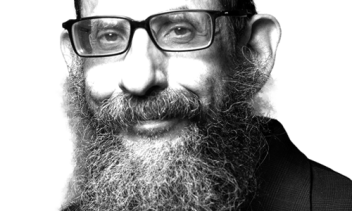The conversation with Rav Dovid about my religious journey (written about in more detail here) focused heavily on the social and experiential aspects of my journey from the Conservative movement to Orthodoxy. Due to the time constraints in our conversation, we couldn’t touch on the intellectual side of my journey, which I felt left a lot unsaid when I listened to our conversation again prior to its release. This brief essay is intended to supplement that conversation by outlining the philosophical considerations that helped push me into Orthodox Judaism against all of the strong pragmatic arguments pulling me in the opposite direction.
Discovering Jewish Philosophy
As mentioned in the interview, my journey back to religiosity began with the reawakening of my intellectual attraction to Judaism. This came from three distinct, though complimentary, directions; academic studies, personal research, and traditional Torah study.
At Rutgers University, I made the decision to major in Jewish Studies and minor in Philosophy, in addition to my more practical studies. That choice gave me the opportunity to learn from many outstanding intellectuals who I still greatly admire. In the field of Bible, Professor Gary Rendsburg meticulously demonstrated how well constructed and deserving of study the Torah was. He took time and effort to show how both the general structure and specific wording of the Five Books of Moses were carefully crafted and rejected typical forms of the documentary hypothesis in order to maintain the creative flourishes and careful repetition. This showed me that a) the Torah’s narratives did not have to be broken down into documents to be read as a literary unity and b) that the Torah was worth taking seriously on its own merits and not just as a source of religious devotion. While studying under Professor Rendsburg, I also read many books on the broader subject of Biblical Criticism. While I didn’t agree with everything I read, each added something new. Professor Benjamin Sommer’s Revelation and Authority showed me that the findings of Biblical Criticism are ultimately irrelevant to theology and halakhic observance and also opened my eyes to the fact that even serious scholars who believed every tenet of biblical criticism could still passionately advocate for a historic revelation of God to the Jewish people on Mt. Sinai. Simultaneously, Rabbi Dr. Joshua Berman’s Inconsistency in the Torah showed me that one could justifiably support an older and more unified Torah than most while being taken seriously in the academic community. I came to the conclusion, like Rabbi Dr. Berman, that there is no true consensus in the field of Biblical Criticism. Differences in perspective of what words mean, how old a particular text is, and which verses belong to which sources not only disagree with each other, but also tend to be mutually exclusive. Once only one view can be true, and all are about as plausible as each other, is it dishonest to do research and side with the acceptable perspectives that align with assumptions found within the Jewish tradition?
But it was philosophy that really won me over. Professor Azzan Yadin-Israel showed me that Jewish mysticism could speak to contemporary university students even when understood in its historical context, Professor Elliot Ratzman exposed me to a breadth and depth of thinkers inside and outside of the traditional realm, and Rabbi Dr. Sam Lebens demonstrated beyond reasonable doubt that the principles of Judaism could be rationally justified in the face of the highest standards of analytic philosophy. Many of the essays I wrote for him largely remain the foundations of my own faith.
In addition to my classes, I also read whatever thinkers I could find on my own time. The first philosopher to catch my attention was Baruch Spinoza. His Theological-Political Treatise convinced me that religion had to be a labor of love rather than just something one did in order to receive reward or escape punishment Additionally, it would have to be sufficiently rational to warrant adherence in the first place. Judaism was unable to reach that point for Spinoza himself, but I was determined to use every tool now available to students of philosophy to get around his critique without sacrificing the search for capital-T truth in the process. From there, Mordecai Kaplan’s Judaism as a Civilization showed me that Jewish practices could still have personal and communal meaning even in absence of a personal God, Abraham Joshua Heschel’s Man is not Alone and God in Search of Man redeemed God’s personality and relatability in my life, Rav Joseph B. Soloveitchik’s Halakhic Man and Halakhic Mind showed me that Jewish Law as traditionally interpreted would be the ideal medium in actualizing my newfound religious fervor, and Rabbi Dr. Norman Lamm’s Torah U’Madda showed me that I could be a serious Jew while also continuing serious engagement with broader knowledge and culture.
… if we think that actual content is able to be revealed by the personal God … we have an obligation to live that content to the best of our abilities.
On the traditional end, I spent time in several yeshivot ranging from chareidi to pluralistic. In addition to learning how deep the sea of Talmud could be, I was inspired by how the Rambam responded to Aristotelianism in his Moreh Nevuchim; I learned to view Torah study as a religious enterprise itself through Rav Chaim of Volozhin’s Nefesh HaChaim; I began to see myself as part of a broader divine picture through the Alter Rebbe’s Tanya; I came to see Hashem with me even in my failures through the Likutei Moharan, the Mei HaShiloach, and Tzidkas HaTzaddik; and I learned to look past my own preconceived notion of what God’s plan should look like and how to integrate halacha into my broader derech halimmud [learning style] through the Chazon Ish’s Emunah U’Bitachon.
Bringing it Together
But I still needed to construct my own perspective. The negative time I had with kiruv [Orthodox Jewish outreach] prior to university had shown me that any religious decisions I’d made had to be intellectually defensible and not just experiential. If I was going to be religious again, I needed to actually believe in it. I was not able, like so many of my peers, to entirely remove religion from the empirical realm or to live with unanswerable questions. Eventually, I was able to articulate a basic personal theology.
Please note that this brief summary is expanded from a Facebook post mentioned by Rav Dovid in our interview. It is not meant to be a formal argument but rather an articulation of the basic reasons for my own belief.
1) God
My belief in God stems from a combination of three things: intuition, philosophy, and a leap of faith. Intuition gets me to the sense of our universe having a creator of some kind. At some point, the question of “where did the universe come from” either becomes an infinite regress or stops with a point of creation caused by something. My personal intuition points towards the latter. While I acknowledge that others may not share that intuition, it is mine. Philosophy then brings me to a First Cause that fine-tuned the universe for life. Once that fine-tuning is acknowledged, it is much less of a leap to there having to be a reason for that fine-tuned existence. That reason can, at the most basic of levels, be described as a divine or cosmic “will.”
2) Revelation
Once there is assumed to be a Being that exists and created existence through an act of will (my primary leap of faith), it makes sense that such will would be detectable in some way. Several scholars, including those like Benjamin Sommer and James Kugel who do not see the Torah as reflecting God’s communication even indirectly, still advocate for a historical moment of divine revelation of God to humanity. The exact nature of that revelation is ultimately unknowable. The most rationally appealing articulation that I’ve found of prophecy in general is that offered by Maimonides in The Guide for the Perplexed. Prophecy there is described as a constant emanation from the Divine Source that a well-trained mind can (with God’s permission) tap into and translate into human language with varying degrees of exactitude. Moses’ prophecy was perfectly exact, resulting from his rational capacity as opposed to the imaginative capacity that other prophets used. More maximalist models of revelation are easily available throughout the Jewish tradition, though.
3) Response
The revelation of Torah gave the people there a sense of binding obligation to it, expressed always in the form of particular practices. Does God necessarily “want” each particular practice that developed over time? Not necessarily—some we know were strictly rabbinic in origin—but God gave our national leaders interpretive authority and therefore Judaism as it developed can ultimately be said to represent an extension of the divine will as long as it authentically finds roots in the Torah’s divine words. Alternatively, if God’s guiding hand can truly be perceived through time, the development of halacha can be seen as having been guided as well. Like with prophecy, more maximalist voices can be found throughout the tradition on this as well.
4) Judaism
It makes no sense to me that a national revelation, which gave an entire people a sense of obligation (even if that sense was not inconsistently lived up to) can be overridden by a single person’s prophecy. Therefore I’m not personally concerned with claims that other Abrahamic religions that seek to lessen religious obligation or fundamentally redirect it are valid. They may very well make legitimate experiential claims on others, but they are neither epistemically nor pragmatically rational options for me. A harder choice is between Judaism and what I can generally call “pure philosophy.” My intuition of a creator whose will is communicated somehow to humanity combined with the plausibility of the basic principles of Judaism have proven enough to tip the scale. I cannot say with certainty whether those factors would also be enough for others, but I certainly believe they can be, even in absence of pragmatic factors. The issue is largely not in the epistemic arguments that can be made for basic tenets of Judaism but with how those arguments are often (mis)represented as well as factors on the receiving end. It is the job of outreach workers to cultivate healthy receptivity in an intellectually honest way.
5) Consistency
So why is Orthodox Judaism my particular mode of praxis, as opposed to other philosophically justifiable and halachically-observant options? The pragmatic (cop-out?) answer would be to say that it’s the most sustainable option in a long-lasting communal setting. As Dovid Bashevkin would say, it’s the only Jewish community where you can consistently find a mincha minyan on a Wednesday. Truthfully, though, I believe that if we think that actual content is able to be revealed by the personal God Who intentionally created us then we have an obligation to live that content to the best of our abilities. Intellectual honesty and consistency deserve no less. So if the Torah is God’s expressed will and the rabbinic interpretation of that will is itself divinely mandated then it makes perfect sense to me why someone should be an Orthodox Jew to the exclusion of other religious options as long as such a position is itself rationally justifiable. Experiential and pragmatic factors can and should supplement one’s religious growth, but if we cannot understand why we do what we do, then what are we doing in the first place? As Rabbi Abraham Joshua Heschel wrote in Toward an Understanding of Halachah,
It was at an early stage in my studies at the university that I came to realize… if God is real, then He is able to express His will unambiguously… From a rationalist’s point of view it does not seem plausible to assume that the infinite, ultimate, supreme Being is concerned with my putting on tefillin every day. It is, indeed, strange to believe that God should care whether a particular individual will eat leavened or unleavened bread during a particular season of the year. However, it is that paradox, namely that the infinite God is intimately concerned with finite man and his finite deeds; that nothing is irrelevant in the eyes of God, which is the very essence of the prophetic faith… If we are ready to believe that it is God who requires us “to love kindness,” is it more difficult to believe that God requires us to hallow the Sabbath and not to violate its sanctity?
A General Disclaimer
As noted throughout, my primary goal was just to outline the reasons for my own belief, not to present any formal arguments in favor of them. Furthermore, I care more about being able to accurately demonstrate rational plausibility than certainty. While I believe proofs leading to certainty are out there, I do not believe we have found them yet. While the ideal goal is to reach proof, the best I can currently achieve is knowing that my beliefs are at least as rationally grounded as the alternatives and, indeed, more rational than many. In absence of certainty, rational plausibility and experiential value can unite to form a compelling reason to live a Jewish life. But that cannot and should not eliminate the need to continue our search for certainty.








